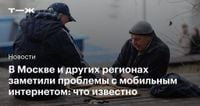On May 5, 2025, residents across several regions of Russia reported significant disruptions in mobile communications, with the majority of complaints originating from Moscow and the Moscow region, as well as St. Petersburg. According to data from Downdetector and Sboy.rf, the first reports of mobile network failures began to surface around 11:00 AM Moscow time.
Residents from various areas—including Nizhny Novgorod, Tver, Yaroslavl, Tambov, Novosibirsk, Karachay-Cherkessia, Chuvashia, and others—experienced issues with calls, SMS, and mobile internet access. The outages affected all major mobile operators, including Tele2, MTS, MegaFon, and Beeline. Reports indicated that at least 8,400 subscribers faced difficulties due to the widespread disruptions.
The peak of the failures for Tele2 and Beeline occurred at 11:15 AM, while MTS and MegaFon experienced their highest number of complaints at 11:30 AM. As the day progressed, the volume of complaints decreased significantly; for instance, by 3:21 PM, the number of reports concerning MTS had dropped from 2,724 to just 58.
In response to the situation, Beeline stated, "Mobile communications in Moscow may work with interruptions for reasons beyond the operator's control." The operator advised customers to connect to the internet via Wi-Fi and to use the VoLTE function on their smartphones for voice calls. MegaFon confirmed that there were "difficulties with internet access," asserting that there were no restrictions on their end and attributing the issues to factors outside of their control. MTS and Tele2 did not provide any comments on the matter.
Roskomnadzor, the Russian telecommunications regulatory authority, claimed that it "does not record failures in the operation of Russian mobile operators." However, the Unified State System for the Prevention and Liquidation of Emergency Situations (RSChS) warned residents of Moscow about possible internet access restrictions due to security measures related to ongoing festive events. This warning coincided with a rehearsal for the air portion of the Victory Parade, which took place around 11:00 AM on the same day.
Another rehearsal for the Victory Parade is scheduled for the morning of May 7, 2025, with the main event set to occur on May 9, starting at 10:00 AM and lasting until noon. The administration of the Astrakhan region also issued a warning about potential communication restrictions during the holiday period, citing "operational necessity related to ensuring security and countering the terrorist threat." They indicated that the speed of mobile internet and communications might be reduced without prior notification to subscribers.
This is not the first time that mass disruptions in mobile communications have occurred in Russia. In January 2024, authorities in the Pskov, Novgorod, and Leningrad regions announced that LTE mobile internet would be shut down for all operators from January 25 to 30 during nighttime hours, from 11:00 PM to 6:00 AM. Officials attributed this to the need for equipment reconfiguration. However, experts questioned the necessity of disconnecting entire regions for such maintenance, suggesting that it was more likely a measure to counter drone attacks.
Sources from RBC connected the 4G shutdown to security measures related to drone threats, explaining that Russian authorities distort GPS signals to prevent guidance for drones. This distortion occurs during the day via surveillance cameras and at night through cellular towers. The nighttime shutdown was justified by the timing of drone attacks.
More recently, on the night of April 27 to 28, 2025, residents of Tver experienced a similar loss of mobile internet service. Problems were noted across all operators, and customer service representatives stated that the disruptions were not related to their operations, leaving them unable to influence the restoration of services. However, traditional telephone services remained stable throughout the incident.
The situation has raised concerns among users who depend on mobile connectivity for daily communication, especially during significant public events. The frequency of such outages, particularly during national celebrations and rehearsals, has led to speculation about the balance between security measures and the rights of citizens to maintain reliable communication.
As the nation prepares for the upcoming Victory Parade, many are left wondering how these disruptions will affect their ability to communicate and access information in real-time. With the government emphasizing security in light of potential threats, the need for transparency and reliability in mobile services becomes even more crucial.
In summary, the widespread failures in mobile communications on May 5, 2025, highlight ongoing concerns about the reliability of telecommunications in Russia, particularly during critical national events. As authorities continue to cite security measures as a reason for service interruptions, the impact on everyday life and communication remains a pressing issue for many citizens.





